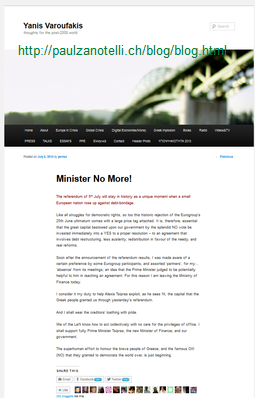

Apparently, he was forced to do so because of his abrasive style in his dealings with counterparts at EU meetings of finance ministers (a charge which has also been levelled at the head of the Greek state by the way). As explained in his blog (in a post entitled ‘Minister no more!’), his ‘absence [… was] judged to be potentially helpful to him [the Greek Prime Minister] in reaching an agreement’.
What struck me in this post was the fact that Mr Varoufakis writes in British English (‘favour’, ‘honour’, ‘I shall’, etc.), which is not that surprising given that he studied in the UK and taught, amongst many other places, at the University of Sydney. However, this is in stark contrast to the general tendency here in Europe, which is to use US English, probably under the misguided belief that it will make the text more amenable to a favourable reception (based on the assumption, equally false, that anything US is trendy or will be perceived as such).
The fact is that here in Europe both our mental and conceptual frameworks as well as our collective imagination have been colonised by the USA (primarily through Hollywood), this at least since the end of World War II, probably already from the 1920s. Until we realise this, and shake off these ‘mind-forged manacles’ (to borrow William Blake’s beautiful expression), we Europeans are unlikely to build a strong and independent EU, including from US financial institutions. Somehow I cannot help but associate this with Etienne de la Boétie's ‘Discourse on Voluntary Servitude’ [Discours de la servitude volontaire], published in 1548. As such, there is no doubt that we have the theoretical framework to do so (we have had it for centuries), but I suppose that we simply lack the will or the courage to act on de la Boétie's suggestion that a tyrant remains in power only as long as we are prepared to submit to him (or her).